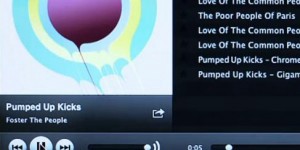The Business of Streaming Music

Yesterday Tim Carmody looked into the question, “Can anyone turn streaming music into a real business?”
Pakman argues that online music distribution will be controlled by a small number of corporate powerhouses that will use songs as a loss leader, the way that Wal-Mart stores once did for CDs. He says companies such as Apple, Google, Microsoft, and Amazon sell music primarily as a means to attract consumers to their mobile products, online stores, and hardware.
“They don’t care if they make money,” Pakman said, “because they make a bunch of money elsewhere on music.”
The evidence so far doesn’t look too promising. Spotify and Pandora have proven to be popular among users, but haven’t found a way to make money because roughly two-thirds of their revenue goes to licensing fees. And as we can see from the above excerpt, the music industry has no incentive to lower these fees when it has other big companies around (Apple, Amazon, Google, Microsoft) who are still willing to sell music as a loss leader to attract customers to their other products.
Streaming works in other industries, like Netflix, despite the similar barriers to success (movies and TV shows are still pirated online, negotiations with studios over licensing content can get expensive). Yet, Netflix has 27.1 million paying subscribers in the U.S. and millions more worldwide (Spotify currently has about five million subscribers paying either $4.99 and $9.99 a month). But they’re, obviously, both very different, which is why I currently pay for Netflix but not Spotify.
• There is no free version of Netflix, just trial subscriptions. Since there is a free version of Spotify (with commercials), and I’m a casual user, there’s no incentive for me to pay.
• I don’t buy movies or boxed sets of TV shows anymore, but I still buy music.
• Netflix streaming and Spotify have a similar disadvantage, which is that not everything is available to stream. In the past, popular artists like Coldplay, Adele, and Taylor Swift have refused to license their music to Spotify, and if someone wanted to hear a new Taylor Swift track they could easily listen to it elsewhere for free (VEVO, YouTube).
• Netflix has experimented (successfully) with producing its own shows, which has proven to be an effective way to draw in more subscribers.
But Spotify is still relatively young and has plenty of time and money (it raised $100 million in funding last year) to figure out how to convince us to open our wallets.
Support The Billfold
The Billfold continues to exist thanks to support from our readers. Help us continue to do our work by making a monthly pledge on Patreon or a one-time-only contribution through PayPal.
Comments